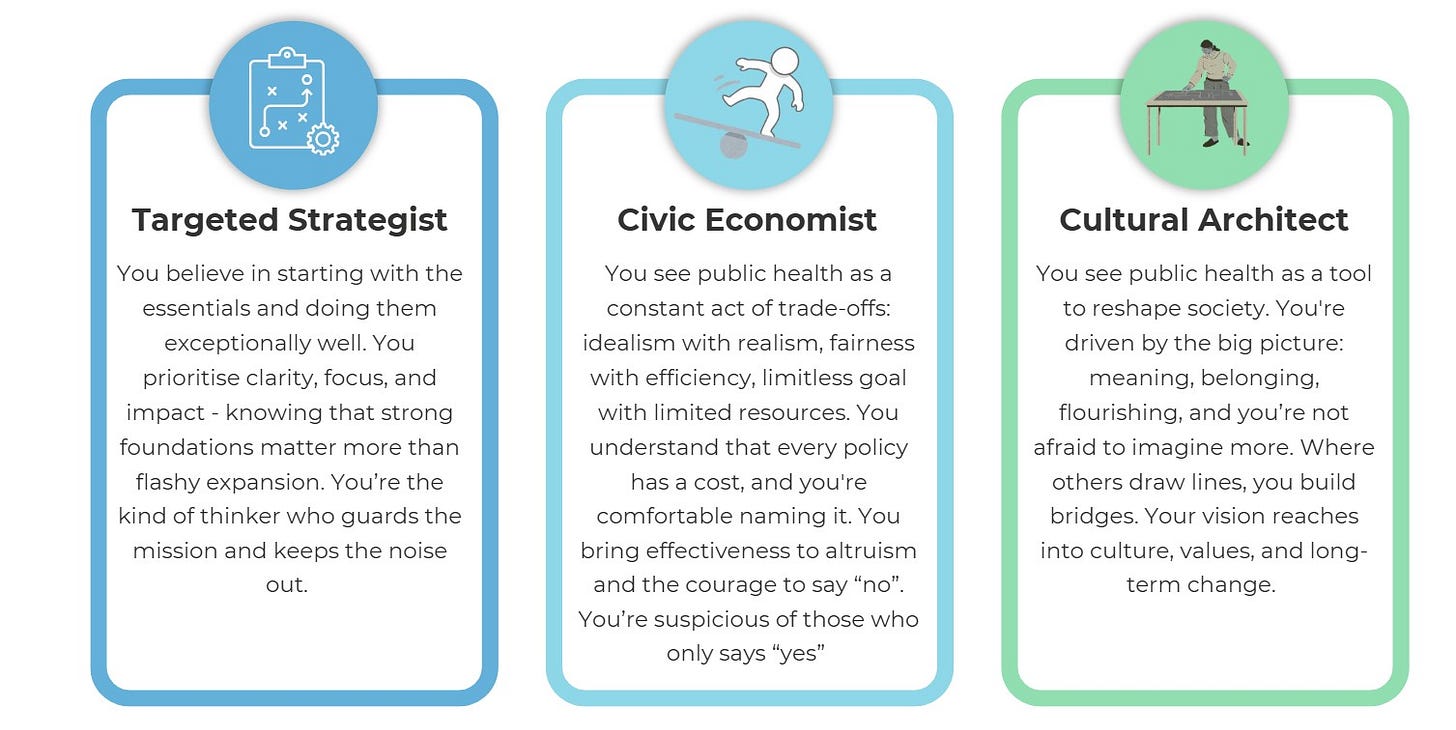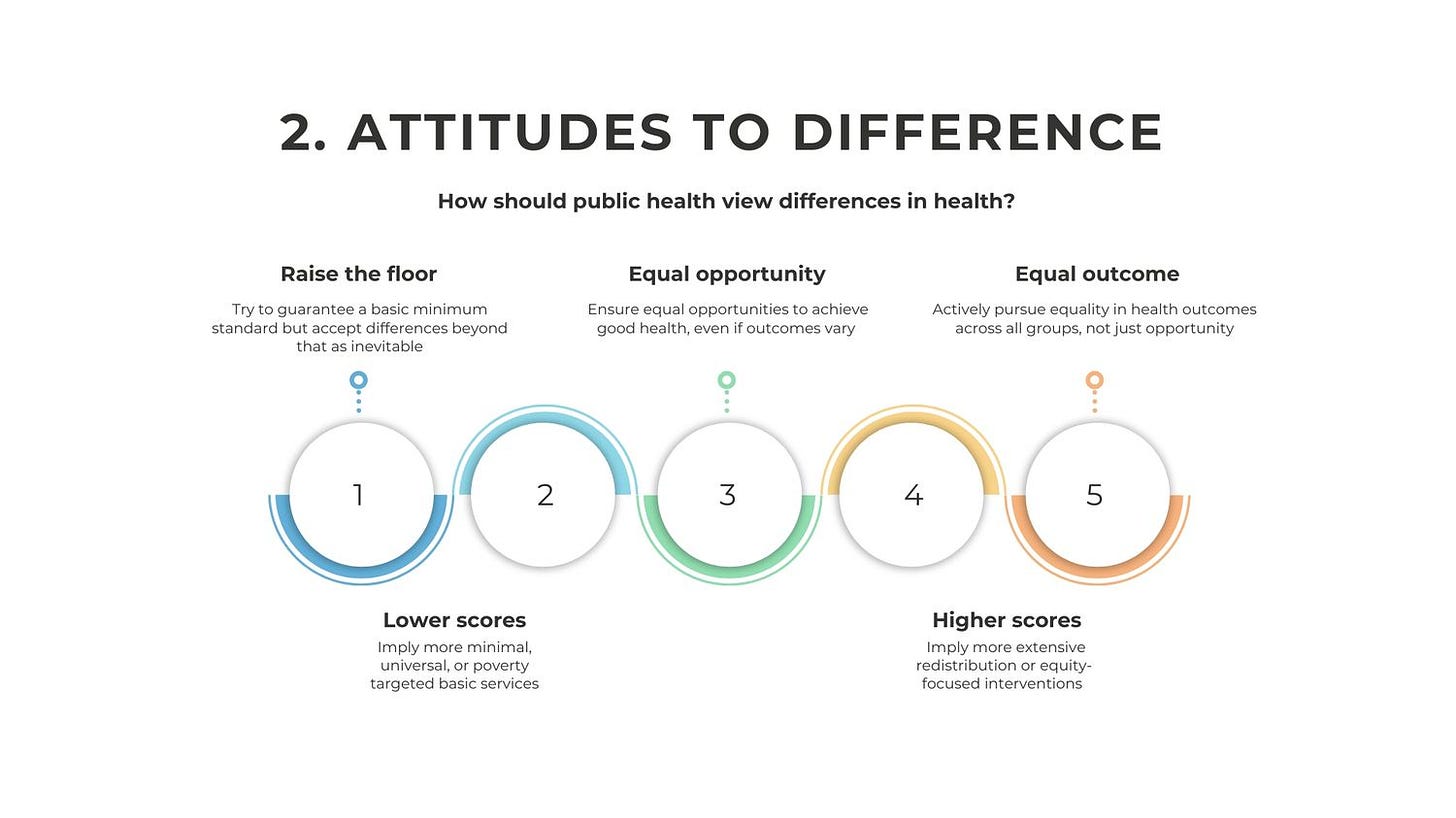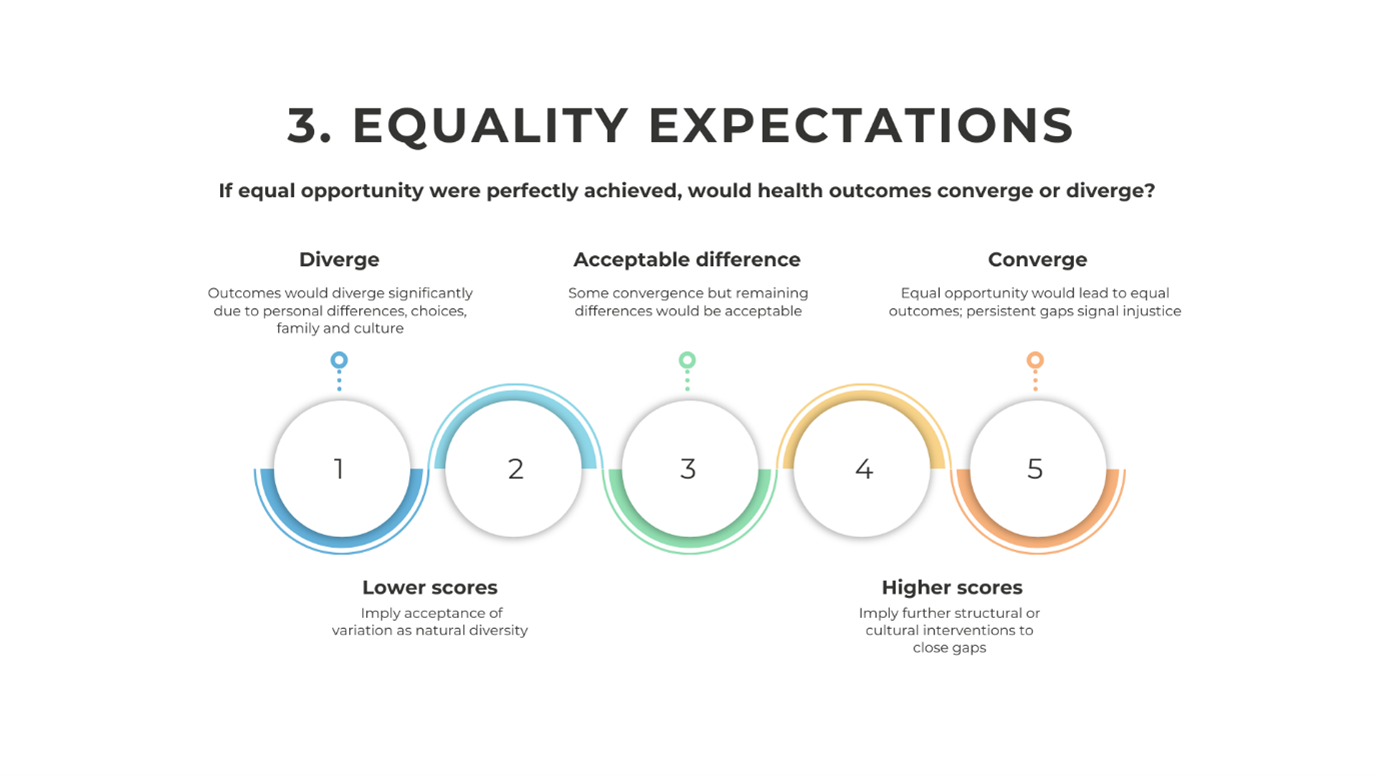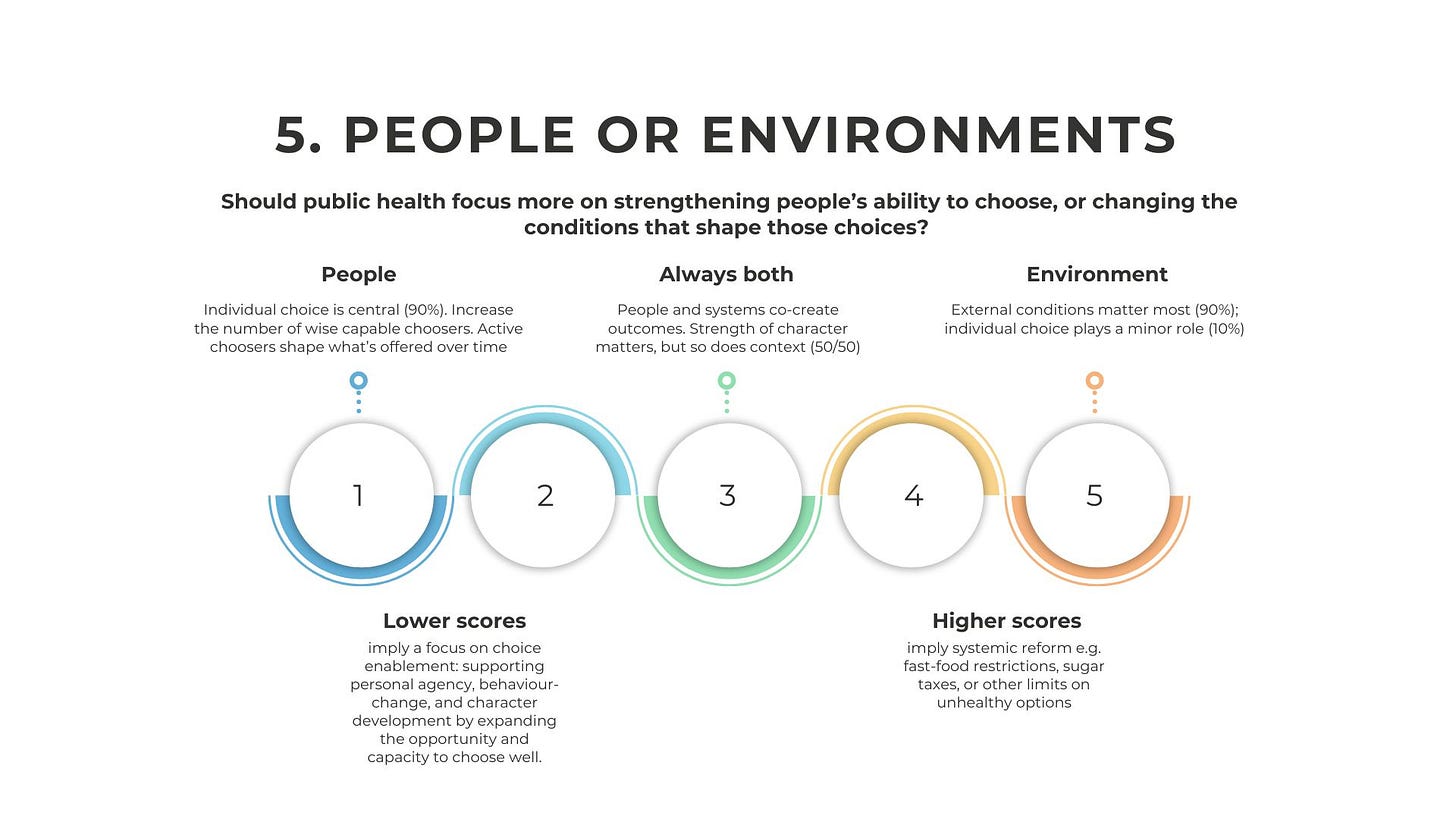What Kind of Health Thinker Are You?
Part 1: A 5-Question Quiz to discover your public health persona
Every policy, intervention, and decision rests on deep, often unspoken, values. They shape what we notice, what we ignore, and the kinds of solutions we're even willing to consider.
Surfacing hidden assumptions is a practical step toward better alignment, clearer decisions, and greater impact.
These five questions reveal how we all think about fairness, freedom, and responsibility, in health and in life.
You can use this quiz to explore your own position, or that of your team, organisation, or even a specific initiative. What assumptions are guiding your work? What values are driving your decisions and energy?
Take the quiz below. Record your score for each question, add them up and meet your public health persona at the end.
If you prefer bigger visuals, access them direct and free on Canva.
1. Goals and Boundaries
What counts as public health, and what is its goal?
Pick your score 1-5:
1: Absence of illness. Focus on preventing “disease” and addressing the most immediate “illness” risks (bounded).
3: Health. Aim to improve measurable “health” outcomes within clearly defined limits
5: Well-being. Promoting comprehensive human flourishing and broad societal “well-being” (boundless).
Tension in Practice: If everything can be framed as public health, why ring-fence the budget? And if the budget is ring-fenced and finite, why define public health in expansive terms like “wellbeing”? Without clear boundaries, anything qualifies; from pothole repairs to poetry workshops, potentially leading to confusion about purpose, competition for resources, and dilution of impact. See “Health: Foundation or Flourishing”.
Practical Implication
Higher scores justify broader, non-traditional interventions e.g. community arts, low speed zones.
Lower scores focus on core health functions e.g. vaccinations, sanitation, harmful housing conditions.
What Kind of Thinker Are You?
1-2: Thomas Hobbes meets Milton Friedman. You prefer minimal state interference and a tightly bounded remit. Health is risk control, not life coaching.
3: John Rawls. Raise the floor, ensure fair opportunity, and respect reasonable state limits. Equal opportunity will lead to unequal outcomes, which is fine as long as the baseline is strong and dignifying.
4-5: Aristotle meets Amartya Sen. You believe public health should support human flourishing in all areas of life, from culture to meaning. Promote the good life, not just reduce the bad.
2. Attitudes to difference
How should public health view differences in health?
Pick your score 1-5:
1: Try to guarantee a basic minimum standard but accept differences beyond that as inevitable.
3: Ensure equal opportunities to achieve good health, even if outcomes vary.
5: Actively pursue equality in health outcomes across all groups, not just opportunity.
Tension in Practice: Conflicting definitions of inequality (of opportunity vs. outcome) create fragmented action and resource allocation debates.
Practical Implication:
Higher scores imply more extensive redistribution or equity-focused interventions.
Lower scores imply more minimal, universal, or poverty targeted basic services.
What Kind of Thinker Are You?
1-2: Libertarian Mill. You’re wary of redistribution and believe fairness means treating everyone the same, not equalising outcomes. Improve the minimum lot of the poor, leave people alone after that. You think there will never be equal opportunity or outcome, the goal is contributory justice, dignity, and honour at any level of society.
3: Rawls again. Equal opportunity is your North Star. Outcomes can differ a lot, but the starting blocks must be fair and improving as a result.
4-5: Marx meets Foucault. Health is justice. Until outcomes converge, the system is broken and unjust. Power shapes everything, including who gets to be healthy.
3. Equality expectations
If equal opportunity were perfectly achieved, would health outcomes naturally converge or diverge?
Pick your score 1-5:
1: Outcomes would diverge significantly due to personal differences, choices, family, and culture.
3: Some convergence would happen, and remaining differences would be acceptable.
5: Equal opportunity would lead to equal outcomes; persistent gaps signal injustice.
Tension in Practice: This thought experiment teases out whether persistent inequality after opportunity equalisation shows structural failure or legitimate diversity. Difficulty separating just difference from unjust difference and blurring the lines.
Practical Implication:
Higher scores imply further structural or cultural interventions to close gaps.
Lower scores imply acceptance of variation as natural diversity.
What Kind of Thinker Are You?
1-2: Epictetus via Existentialism. People are incredibly diverse in natural ability, personality, interests, and goals. They also shape themselves through choices. Respect their paths, even if they diverge widely.
3: Michael Sandel. Respect diversity but watch for invisible barriers. Some variation is fine, but fairness matters. Try to separate bad difference from good difference.
4-5: Iris Marion Young. Persistent gaps mean persistent injustice. Cultural and systemic shifts are necessary.
4. Cultural influence
Should public health proactively shape cultural norms and values?
Pick your score 1-5:
1: Remain culturally neutral, respect cultural diversity, provide information only.
3: Gently influence harmful culture through community support.
5: Actively drive cultural changes to achieve health goals.
Tension in Practice: Health campaigns risk being seen as paternalistic or culturally intrusive.
Practical Implication:
Higher scores imply moral leadership and active campaigns e.g. changing a nations famously unhealthy food culture.
Lower scores imply limited shaping role, mainly educational.
What Kind of Thinker Are You?
1-2: Value-neutral Kantian. Give people the facts and respect their freedom. Public health should inform, not form, existing cultures.
3: Nudge-style paternalist. Influence gently, respecting liberty while shaping default choice environments.
4-5: Plato via Behavioural Science. Culture is policy. Use the tools of influence to build a healthier society.
5. People or environments
Should public health focus more on strengthening people’s ability to choose, or changing the conditions that shape those choices?
Pick your score 1-5:
1: Individual choice is central (90%). We may not choose our circumstances, but we always choose our response. Focus on developing wise, capable choosers. When people are supported to choose well, they gradually shift what’s offered through consumer power.
3: People and systems co-create outcomes. Strength of character matters, but so does context.
5: External conditions matter most (90%); individual choice plays a minor role (10%). People are like balls in a Plinko machine, even if we don’t like to think so.
Tension in Practice:
Overemphasising structure can erase personal agency; overemphasising choice risks ignoring real constraints. Take smoking: it’s more common in poorer areas, but most poor people don’t smoke, and some rich people do. Context shapes behaviour but doesn’t decide it. So what’s the true balance?
Practical Implication:
Higher scores imply systemic reform e.g. fast-food restrictions, sugar taxes, or other limits on unhealthy options.
Lower scores imply a focus on choice enablement: supporting personal agency, behaviour-change, and character development by expanding the opportunity and capacity to choose well.
What Kind of Thinker Are You?
1-2: Structuralist Durkheim. People want to handle their own health. Build agency, not dependency. Strengthen consumer power to shape environments.
3: Virtue ethics meets pragmatism. Context and character interact. Support both. Don’t neglect either.
4-5: Stoic libertarian hybrid. People want to handle their own health. Build agency, not dependency. Increase the number of people who can transcend their circumstances.
Your Public Health Persona
Add up your score from all five questions (1-5 each). Then see which range your total falls into below. There are no “right” scores, simply different assumptions driving different decisions.
Score Range: 5–9
The Targeted Strategist
“Start focused. Deliver well. Grow deliberately.”
You believe in starting with the essentials and doing them exceptionally well. You prioritise clarity, focus, and impact - knowing that strong foundations matter more than flashy expansion. You’re the kind of thinker who guards the mission and keeps the noise out.
Leader example: Steve Jobs (Founder of Apple Inc and former CEO of Pixar)
Why: Known for being obsessed with focus, simplicity, and saying no. Known for cutting features to get to the essence of a product.
“People think focus means saying yes to the thing you've got to focus on. But that's not what it means at all. It means saying no to the hundred other good ideas.”
Score Range: 10–14
The Civic Economist
“Balance, trade-offs, and thoughtful deliberate choices.”
You see public health as a constant act of balancing - idealism with realism, fairness with efficiency, and expansive goal with a fixed budget. You understand that every policy has a cost, and you're comfortable naming it and navigating complexity. You bring discipline to generosity, and courage to say “not now” when needed.
Leader example: Indra Nooyi (former CEO of PepsiCo)
Why: Led with stakeholder balance - health, environment, profit. Saw business as a platform for responsibility, but not activism or dogmatism.
“Leadership is not about doing what’s easy. It’s about doing what’s right, even when it’s uncomfortable.”
Score Range: 15–20
The Cultural Architect
“Health isn’t just about living longer - it’s about living better.”
You see public health as a tool to reshape society. You're driven by the big picture: meaning, belonging, flourishing, and you’re not afraid to imagine more. Where others draw lines, you build bridges. Your vision reaches into culture, values, and long-term change.
Leader example: Yvon Chouinard (Founder of Patagonia)
Why: Built a business to change culture, not just sell clothes. Prioritised environmental and social transformation.
“Patagonia is in business to save our home planet”.
Final Thoughts
How much diversity of thinking is there in your team?
Are most people scoring in the same range?
Are certain perspectives missing - the Targeted Strategist, the Civic Economist, or the Cultural Architect?
What might that reveal about your team’s culture, blind spots, or unspoken norms?
Do you have a way to surface difference and work through diversity of thought?
Try this quiz with your team or board: compare scores, reveal assumptions, and get unstuck.
Improving lives starts with improving thinking #FreeRangeThinking.
If you enjoyed this try Part 2: Ticklish Topics Edition
If you like this, you may also like
The Public’s Health
Quiz: What kind of health thinker are you? 5 Foundational Questions
Quiz: What kind of health thinker are you? 7 Ticklish Topics
The £3 Billion Question: What Really Counts as Public Health?
Health: Foundation or Flourishing? Two straws on cup
Equality before freedom? What do we really value most?
Wisdom 1,000 Project
1,000 Fragments of Insight - Introduction (1 min read)
1,000 Fragments of Insight - Culture (39 min read)
1,000 Fragments of Insight - Mindset and Growth (31 min read)
1,000 Fragments of Insight - Existence and Meaning (29 min read)
1,000 Fragments of Insight - Morality, Ethics and Beauty (38 min read)
FreeRangeThinking.Club
When family becomes philosophy (5 min read)
National Therapy – a cultural health check (11 min read)
Principles of a curious conversation (2 min read)
You made it to the end, impressive! I should have released this in 5 shorter parts right? I’m still learning the game. Do drop me a note if you have questions you’d add to a future list. They will vary from mild to wild, foundational to fringe.
Want to show your support?










